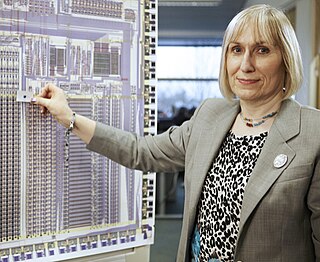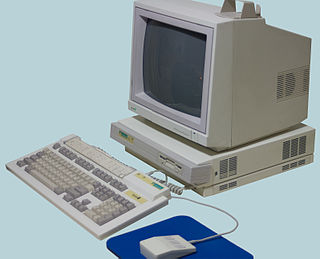
The Acorn Electron was a lower-cost alternative to the BBC Micro educational/home computer, also developed by Acorn Computers Ltd, to provide many of the features of that more expensive machine at a price more competitive with that of the ZX Spectrum. It had 32 kilobytes of RAM, and its ROM included BBC BASIC II together with the operating system. Announced in 1982 for a possible release the same year, it was eventually introduced on 25 August 1983 priced at £199.

Acorn Computers Ltd. was a British computer company established in Cambridge, England, in 1978. The company produced a number of computers which were especially popular in the UK, including the Acorn Electron and the Acorn Archimedes. Acorn's BBC Micro computer dominated the UK educational computer market during the 1980s.

Sophie Mary WilsonDistFBCS is an English computer scientist, a co-designer of the Instruction Set for the ARM architecture.

Acorn Archimedes is a family of personal computers designed by Acorn Computers of Cambridge, England. The systems are based on Acorn's own ARM architecture processors and the proprietary operating systems Arthur and RISC OS. The first models were introduced in 1987, and systems in the Archimedes family were sold until the mid-1990s.

RISC iX is a discontinued Unix operating system designed to run on a series of workstations based on the Acorn Archimedes microcomputer. Heavily based on 4.3BSD, it was initially completed in 1988, a year after Arthur but before RISC OS. It was introduced in the ARM2-based R140 workstation in 1989, followed up by the ARM3-based R200-series workstations in 1990.

The BBC Domesday Project was a partnership between Acorn Computers, Philips, Logica, and the BBC to mark the 900th anniversary of the original Domesday Book, an 11th-century census of England. It has been cited as an example of digital obsolescence on account of the physical medium used for data storage.

Hermann Maria Hauser, KBE, FRS, FREng, FInstP, CPhys is an Austrian entrepreneur, venture capitalist and inventor who is primarily associated with the Cambridge technology community in England.
Xara is an international software company founded in 1981, with an HQ in Berlin and development office in Hemel Hempstead, UK. It has developed software for a variety of computer platforms, in chronological order: the Acorn Atom, BBC Micro, Z88, Atari ST, Acorn Archimedes, Microsoft Windows, Linux, and more recently web browser-based services.
The Acorn Communicator is a discontinued business computer developed by Acorn Computers. Mentioned in the computing press in late 1984 as the C30, previewed in early 1985 with estimated pricing between £500 and £800, in late 1985 with a built-in LCD display, and subsequently unveiled in a slightly different form, the system sold in very low numbers to companies requiring a computer with a built-in modem.
The Acorn Business Computer (ABC) was a series of microcomputers announced at the end of 1983 by the British company Acorn Computers. The series of eight computers was aimed at the business, research and further education markets. Demonstrated at the Personal Computer World Show in September 1984, having been under development for "about a year" and having been undergoing field trials from May 1984, the range "understandably attracted a great deal of attention" and was favourably received by some commentators. The official launch of the range was scheduled for January 1985.

A BBC Micro expansion unit, for the BBC Micro is one of a number of peripherals in a box with the same profile and styling as the main computer.

Qume was a manufacturer of daisy-wheel printers originally located in Hayward, California, later moving to San Jose. Around 1980, it also opened a manufacturing facility in Puerto Rico. It once dominated the daisy-wheel market. As the market for its printers declined in the 1980s, the company developed a line of computer terminals. It was founded by David S. Lee and Robert E. Schroeder in 1973, grew to become the largest printer company in the world, and was acquired by ITT Corporation for an unprecedented $164M in 1978. It remained a division of ITT until its acquisition by Wyse Technology sometime before 1995. Qume also manufactured floppy diskette drives, particularly 5.25" ones, but it also manufactured 8" diskette drives as well. Qume's diskette drives were included in some IBM PC models, such as the Portable Personal Computer and PCjr.

Acorn User magazine was founded by Acorn Computers in 1982, contract-published by Addison-Wesley, to coincide with the launch of the BBC Micro. It covered the range of Acorn home computers, the BBC Micro and Atom at first and later the Electron, Archimedes and Risc PC.
James George Mitchell is a Canadian computer scientist. He has worked on programming language design and implementation, interactive programming systems, dynamic interpreting and compiling, document preparing systems, user interface design, distributed transactional file systems, and distributed, object-oriented operating systems. He has also worked on the design of hardware for computer graphics, high-level programming language execution, and audio input/output.
Torch Computers Ltd was a computer hardware company with origins in a 1982 joint venture between Acorn Computers and Climar Group that led to the development of the Communicator or C-series computer, a system based on the BBC Micro with a Z80 second processor and integral modem, intended as a viewdata terminal.

The A7000 and A7000+ were Acorn Computers' entry level computers based somewhat on the Risc PC architecture.

The British Broadcasting Corporation Microcomputer System, or BBC Micro, is a series of microcomputer designed and built by Acorn Computers Limited in the 1980s for the Computer Literacy Project of the BBC. Designed with an emphasis on education, it was notable for its ruggedness, expandability, and the quality of its operating system. The machine was the focus of a number of educational BBC TV programmes on computer literacy, starting with The Computer Programme in 1982, followed by Making the Most of the Micro, Computers in Control in 1983, and finally Micro Live in 1985.
Galileo was an unreleased 32-bit operating system that was under development by Acorn Computers as a long-term project to produce "an ultra-modern scalable, portable, multi-tasking, multi-threading, object-oriented, microkernel operating system", reportedly significant enough to Acorn's strategy to warrant a statement to the financial markets.
Impression is a desktop publishing application for RISC OS systems. It was developed by Computer Concepts and initially made available in pre-release form during 1989, having been demonstrated in February 1989 at the Which? Computer Show and subsequently announced as being available from June 1989. The "completed" version was eventually delivered on 18th January 1990.
Alexander Rupert van Someren FREng is a British computing entrepreneur and venture capitalist, best known for founding the hardware encryption company nCipher in 1996 with his brother Nicko van Someren. In July 2021 he was appointed Chief Scientific Adviser for National Security, succeeding Anthony Finkelstein.














